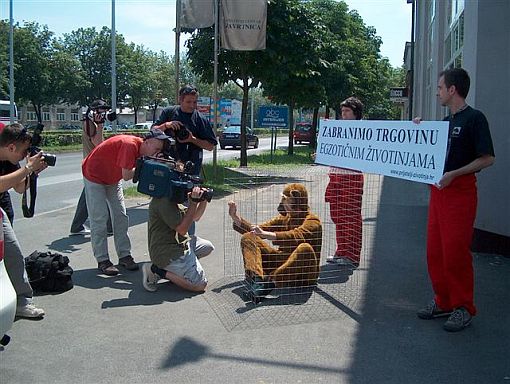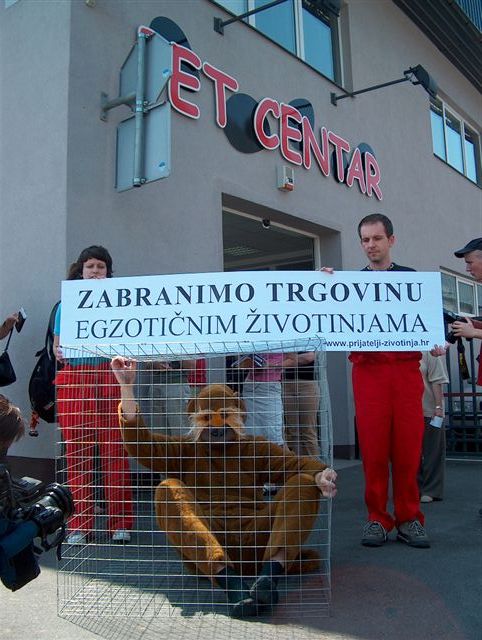07/01/04 Exotic Animals Trade
Animal Friends' first protest against selling of exotic animals in pet shops; we ask for ban of exotic animals trade!
As a result of growing trend of buying exotic animals as pets, and their popularization in media, Animal Friends warns about cruelty incorporated in exotic animals trade.
On Thursday, July 1, 2004, at noon, in front of Pet Center in Heinzelova 62, our activists will cage up an exotic animal, hold banners and hand out flyers. We ask public not to participate in inhuman exotic animal trade by not buying such animals and asking pet shop owners not to sell them.
Each year great number of people buys exotic animals as pets, such as tropical birds, reptiles (snakes and lizards), prairie dogs, fish, turtles, apes and alike. In pet shops those animals are kept in tiny, inappropriate and unhygienic conditions. Because of their high prices they can stay in pet shop for very long time awaiting for buyers. They are placed in narrow cages and terrariums which are too small and inappropriate for particular species and workers in pet shops are not educated well enough on specific needs of such animals. Animals don't belong in narrow cages, terrariums or aquariums, but in their natural surroundings.
Animal Friends will report pet shops which sell exotic animals in Zagreb to Veterinary inspection which will evaluate how (in)appropriate are the conditions of keeping and selling of those animal.
It is estimated that worldwide, often illegal, trade in exotic animals includes around 350 millions of live animals which worth over 20 billions of US dollars, what puts exotic animal trade in a third place of illegal trades, right after drugs trade and arms trade.
Taken from their natural environment, over 90% of animals end up injured: during hunt and transport, because of exposure to extreme heat and cold, shortage of food and water, overcrowded conditions in closed boxes and bags and they often suffer from infectious diseases. Before the ship transport, birds are often force-fed, their wings and beaks are tied, and they are pushed in narrow luggage. Stolen eggs of birds and lizards are hidden in specially made waistcoats. Lizards are being drugged and stuffed in containers with double bottoms. Baby turtles are tied in a way they are closed in their shells, wrapped in socks and stuffed in tubes, and baby pythons are stored in CD boxes.
Many pet shops sell exotic animals to inexperienced people, and provide inadequate and false information on the needs of the animal. Animals die because of inappropriate diet, unnatural and uncomfortable surrounding, loneliness and stress in captivity. Exotic animals can be carriers of dangerous infectious diseases, such as rabies, tuberculosis, hepatitis, leptospirosis, salmonella, and cause serious health problems to their owners. Most veterinarians in Croatia are not educated for making the diagnosis and treatment of exotic animals' illnesses.
In proposal for new Animal Welfare Act, made by our organization, which is expected to be discussed in parliament some time in September, Animal Friends asks for the ban of breeding, selling and keeping of animals that are on CITES's (Convention on International Trade in Endangered Species of Wild Fauna and Flora) list of exotic animals.
We think that the biggest efforts must be made in enforcement of legal bans and in education of border workers and others who professionally deal with this issue, and in introducing of inspectors' control on critical places of entry and exit of the country, what would make smuggling of animals less possible.
We must not allow that because of bad control and enforcement of laws Croatia becomes exotic animal trade paradise. When animals are taken away from natural surrounding, it effects entire populations and ecosystems. Instead of supporting inhumane exotic animal trade, we ask citizens to provide homes for abandoned animals placed in shelters.

